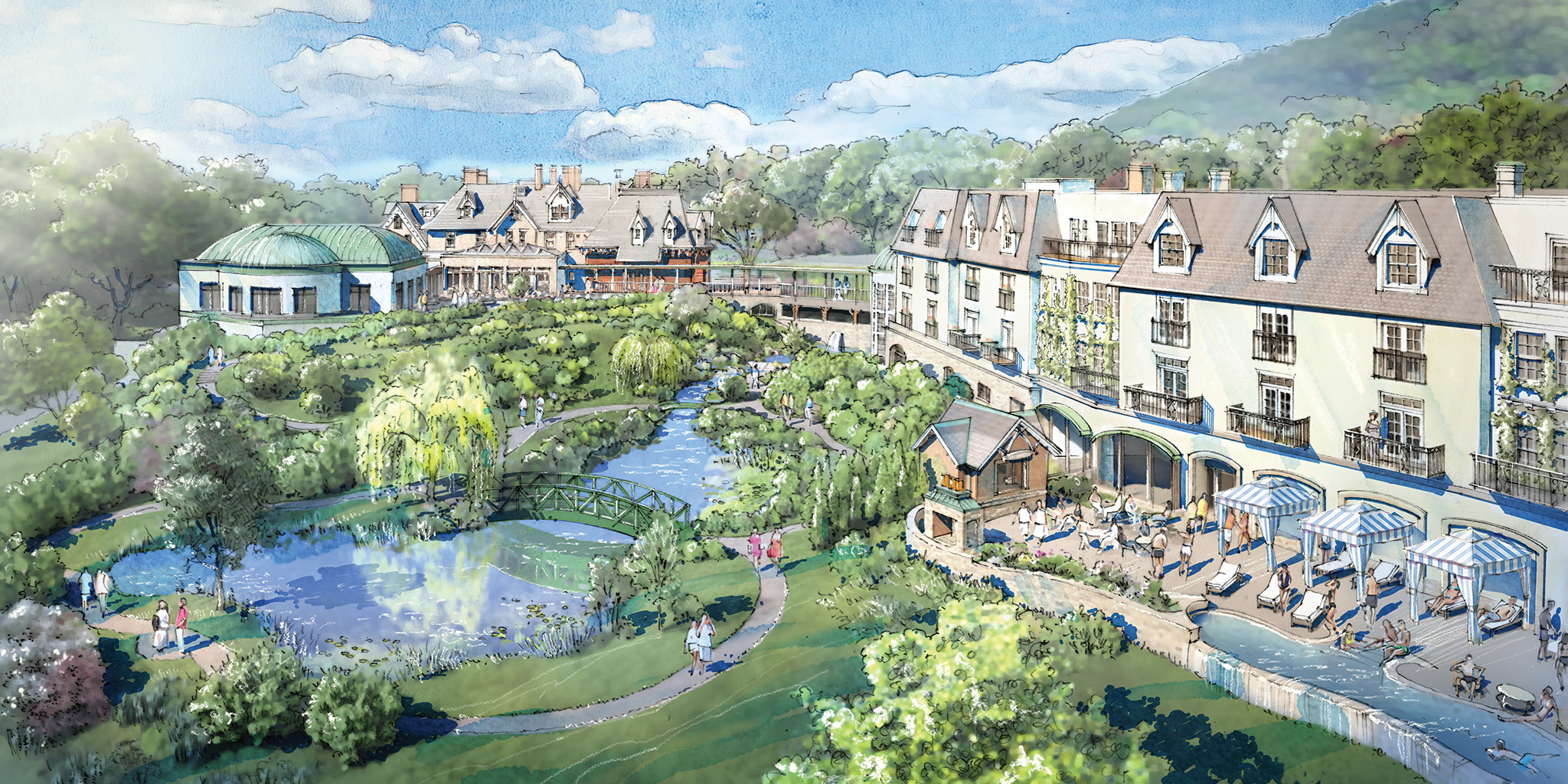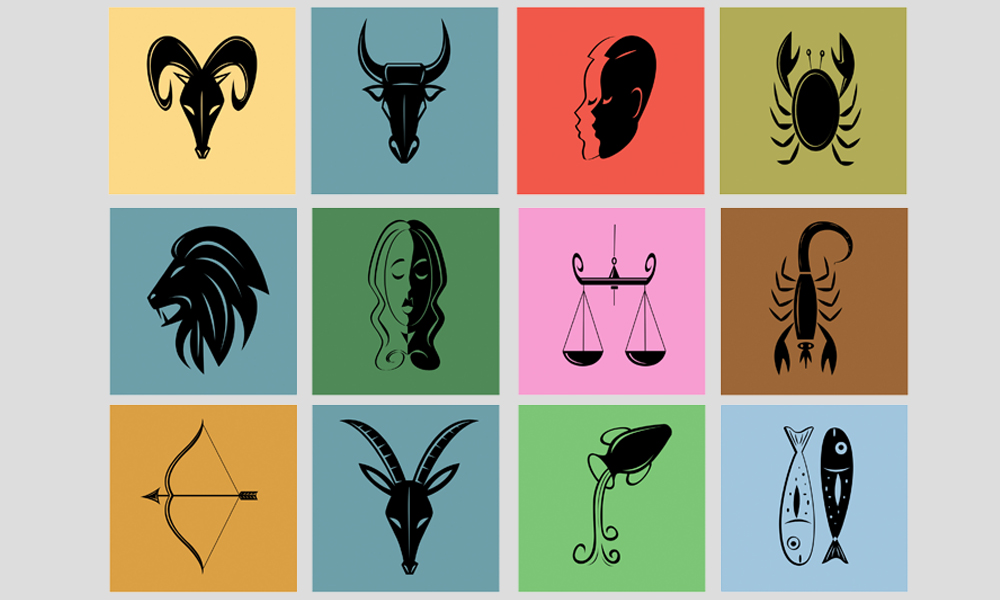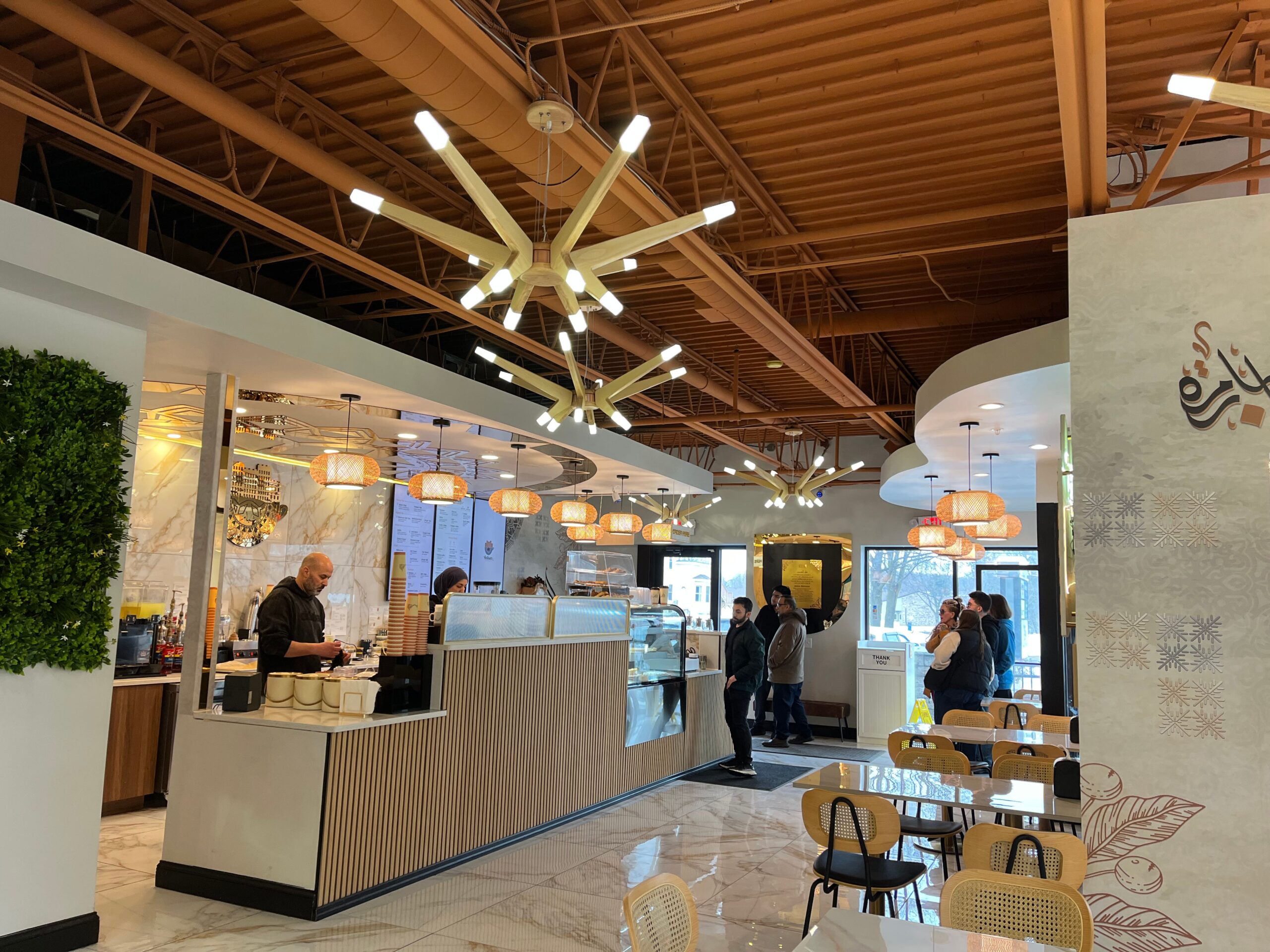Photography by Megan Mumford
When Eleina Hinch was still in her teens, she built a YouTube beauty channel with 25,000 subscribers. But something was missing. Despite her big following and growing renown as an influencer, she often felt lonely. Things worsened during the pandemic, when her father and grandfather both died, and her mother underwent treatment for cancer. Her closest friends lived back in the Philippines, where she was born.
“That was probably the lowest time in my life,” says Hinch, who’s now 26. “I could only FaceTime my friends—they were in a different country. It’s not like they could just come over. I was desperate for any type of social connection.”
While Hinch’s generation—those born between 1997 and 2012 and commonly known as Gen Z—are able to connect with others quicker and easier than ever before thanks to social media, study after study has shown that today’s teens and 20-somethings are also lonelier than ever before. And it’s not just 13- to 28-year-olds who are feeling the effects of society’s shift to online life—in 2024, former US Surgeon General Vivek Murthy declared a national loneliness and social isolation epidemic, warning that about half of American adults are experiencing considerable levels of loneliness.
“We are so lonely—especially my demographic and younger,” Hinch says. “We live online, and it’s not real. I want to experience real connection. People need each other more than ever.”
Instead of sitting at home, tweeting about it, Hinch did something to change her situation: She started Girls Upstate, a wellness social group that organizes events and activities—everything from floral arranging classes to bestie speed dating, where the speed dating format is used to help women find new friends. The ultimate goal? To create safe, inclusive spaces where women can open up, share their stories, and simply have fun.
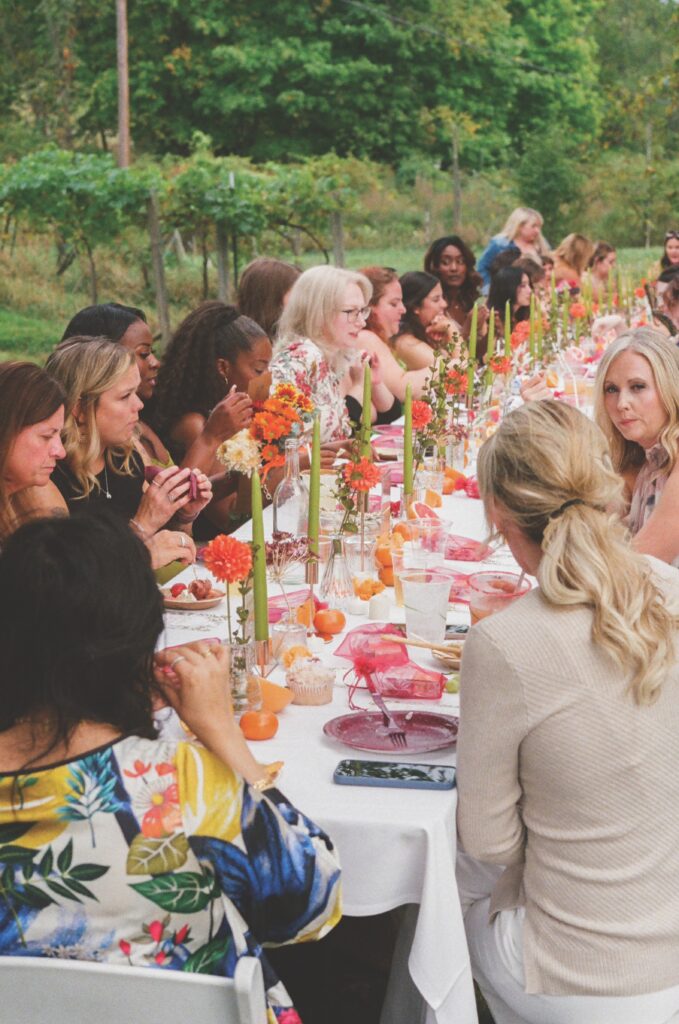
The first Girls Upstate event was a potluck in the basement apartment of one of Hinch’s friends in the fall of 2022. Hinch cooked trays of pasta and meatballs and expected a small crowd for a night of cookie decorating. Forty women showed up. “I was like, ‘Well, this is a thing,’” she says.
While everyone loves to lament how hard it is to make friends as an adult, Hinch is one of a small-but-mighty contingent of local community leaders who are challenging that narrative by way of social groups that were created for the sole purpose of fostering in-person connections for adults of all ages. These groups often use social media to promote events, but their purpose is to get people off their phones and into real-world spaces. They don’t necessarily exclude alcohol, but the focus is typically on physical and mental well-being rather than drinking or partying, activities that have historically connected people but that have been on the decline in recent years.
One such group is Albany Social Cycling, which organizes weekly group bike rides in downtown Albany. Cyclists gather every Thursday at 6:30pm at the Washington Park Lakehouse, though the start time is earlier when the days get shorter, and the group usually takes a winter hiatus.
“Any pace is welcome,” says Matt McGowen, one of Albany Social Cycling’s founders and owner of Freewheel Bike Shop in Albany. “I wanted to give everyone who enjoys riding bikes a casual space to come together and do that.”
When Albany Social Cycling launched in 2022, rides attracted about a half dozen people. That small group has grown, with between 40–60 people showing up for rides that range from 7–17 miles. Volunteers help manage the rides, which use both bike paths and local roads. There’s a ride leader and a sweep to bring up the rear of the group, as well as other volunteers to ensure everyone makes it through intersections safely.
“Most people have never felt the feeling of riding a bike safely on the street,” McGowen says. “We are in a big enough group now that just having the numbers of people we do—it’s a huge buffer, and that makes it more fun because you’re just kind of cruising around.”
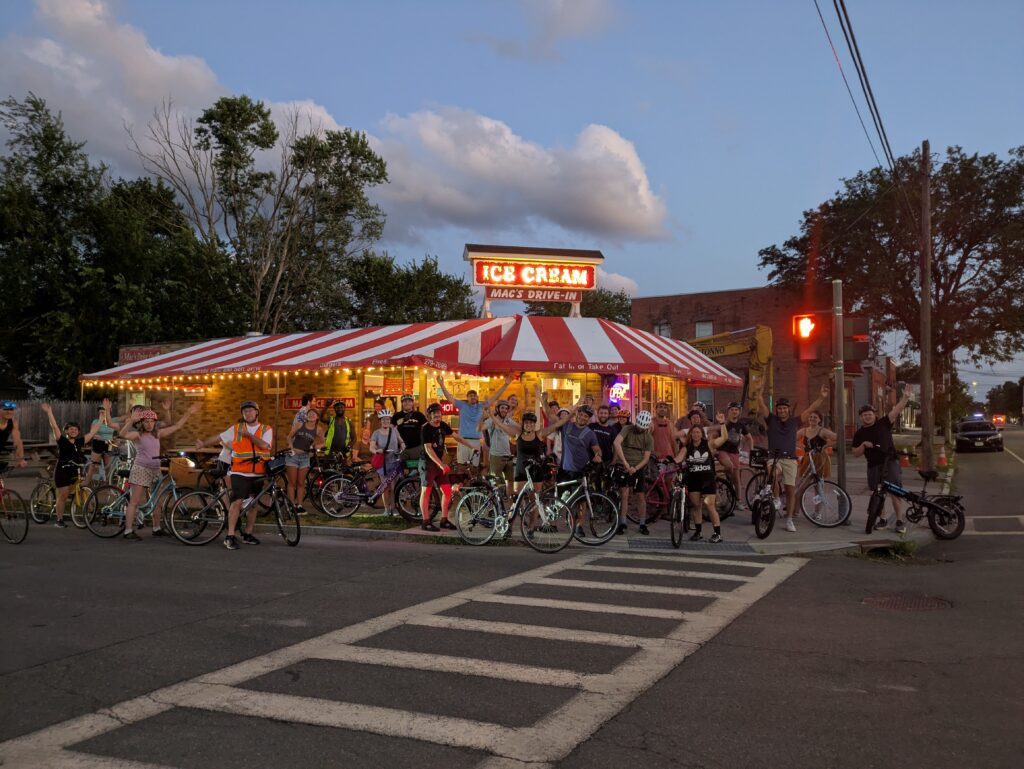
Rides sometimes stop at local bars—Albany’s Warehouse district is a popular destination—and there are also themed rides, such as trips to Indian Ladder Farms in Altamont or Radix Ecological Sustainability Center, an urban farm in Albany’s South End.
“People need community and stuff to do,” McGowen says. “That’s what makes a city livable—all those little things, those little points of light in your week.”
Albany native Jenna Clark left the US when she was 25 to travel the world and work remotely. For four years, her home base was Puerto Escondido, a beach town on the west coast of Mexico, where she became part of a beach volleyball group. “It was a very welcoming vibe, and it wasn’t 100 percent about volleyball,” she says. People hung out, played games like frisbee, and simply enjoyed each other’s company.
Clark returned to the Capital Region two years ago and now lives in the Saratoga County town of Milton, where she hopes to cultivate the kind of community she experienced in Mexico. She purchased a house that she’s in the process of converting into a commercial property that will feature two volleyball courts, yard games, and a year-round cafe. Here, she intends to create Casa Volley, a volleyball social club where beginners can learn the sport and more skilled players can compete at a higher level. She is aiming for a soft opening in 2026 and a more formal opening in 2027.
“I see the word community thrown around a lot,” Clark says. “Builders use it. ‘Oh, there’s a new community we’re building here.’ But the true definition of community is people coming together on a regular basis. It’s almost like a religion. You have similar values or connectedness, you learn from each other, you encourage each other to be better. You’re there for each other.”
Another group, the Undrunk Club, aims to create a safe, inclusive space for non-drinkers and sober-curious women.
Founded two years ago by Stillwater resident Ashley Salvadore and Kyle Posson of Johnstown, the group’s activities include sober karaoke, music bingo, and outings to local establishments such as Prince Tea House in Albany and The Golden Monkey Lounge in Glens Falls. Mocktails are served, and women are encouraged to come meet their new “BFFs” (booze-free friends).
“We wanted to show people that they can have fun without the hangover,” Posson says.
The group’s first event, a get-together at The Delaware in Albany, drew about 50 women. “We were both pleasantly surprised, given that it was our first rodeo,” Posson says. “The response was, ‘When is the next one?’” That strong turnout demonstrated that there were many women like Posson and Salvadore—women who don’t drink but don’t want to miss out on the social connection so often found in spaces where alcohol is served, like bars.
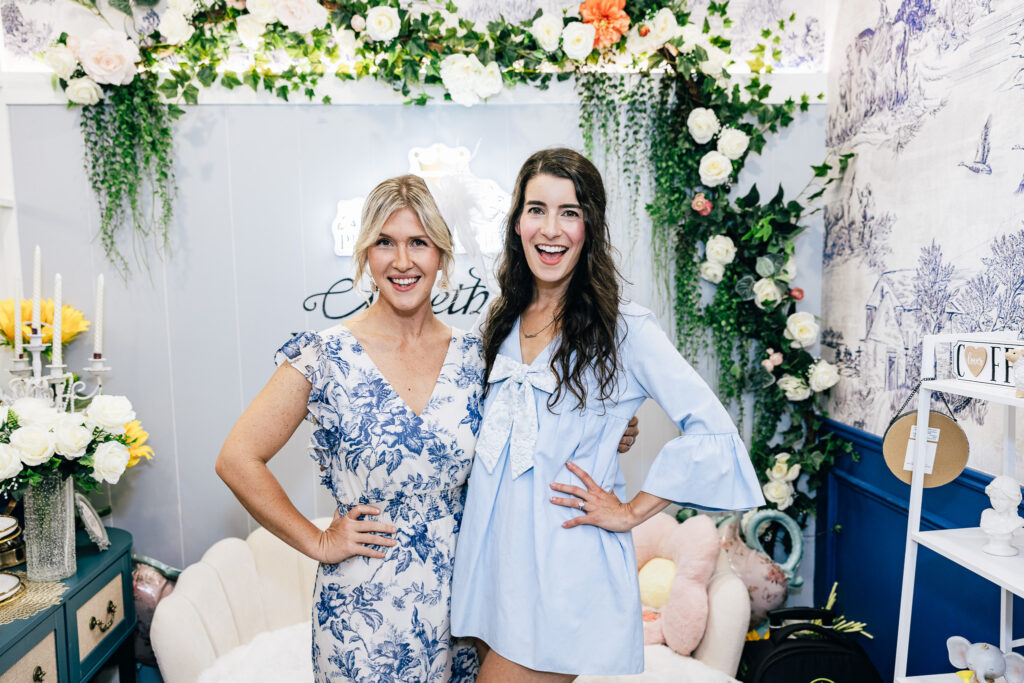
“People are interested in health and fitness,” Posson says, “and alcohol doesn’t fit their health and fitness journey.”
At Palette, a coworking space in downtown Saratoga Springs, work and community are intertwined. The organization has about 200 members—a mix of small business entrepreneurs and professionals who work remotely—who turn to each other for business tips, life advice, workday company, and friendship. Members have access to workspace, meeting rooms, and offices, as well as a digital community, though in-person connection is the focus.
Palette is female-focused, but counts men among its members. “It’s 100 percent inclusive to everyone,” says Marcella Hammer, who helped found Palette in 2019. “Our two rules are to be kind to everyone, and collaboration first, not competition.”
Prior to Palette, Hammer owned a nail salon called Glitter. It was a solitary experience. “I was alone in a 2,000-square-foot space and I learned that I needed community,” she says. “I needed support, and I was too scared to ask for help.”
Palette taught Hammer that “you can’t go anywhere alone,” she says. “There are so many people out there who are willing to help you and have had experiences they want to share. By showing up to a place like Palette, you open yourself up to those relationships.”
While Hinch, McGowen, Posson, Salvadore, Clark, and Hammer have all gone out of their way to foster real-life, in-person communities, connection only happens when people step outside their comfort zone and actually show up for the first time.
“None of it will work unless people have the courage to show up,” Hammer says. “You have to be open to something new.” McGowen agrees that community doesn’t happen naturally. “It doesn’t just spring out of a crack in the ground,” he says. “If there’s not enough buy-in, social groups just kind of die on the vine.”
Luckily, in the Capital Region, people are buying in. Since Hinch’s 40-person potluck, Girls Upstate has grown into a community with some 10,000 followers, most of whom are based here in Upstate. The group hosts between four and six events per month, occasionally in partnership with local businesses. And real connections are being made at each and every meetup. But don’t take Hinch’s word for it.
“I’ve already signed up for more events,” one member of Girls Upstate wrote in an especially moving review on the community’s website. “Because for the first time in a long time, I finally have hope for finding some truly great new girlfriends.”





